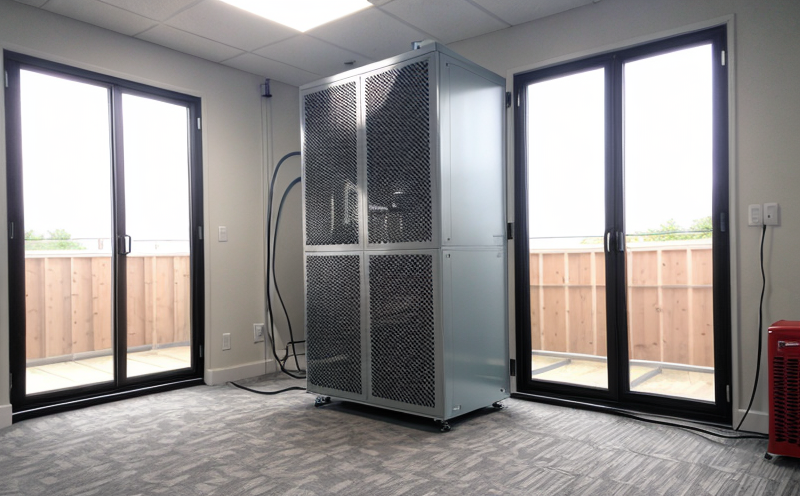ASHRAE 129 Residential Airflow Performance Test
The ASHRAE Standard 129-2021 establishes a method for determining the airflow performance of residential HVAC equipment. This test is crucial for ensuring that air movement through HVAC systems meets the required specifications and contributes to overall system efficiency.
During this testing process, the air distribution system of residential HVAC equipment is subjected to precise measurements under specific conditions. The ASHRAE 129 protocol ensures that the airflow is consistent with manufacturer specifications and that any deviations are identified. This standard plays a vital role in improving indoor air quality and ensuring energy efficiency.
The testing procedure involves measuring the actual airflow through the equipment at various operating points, including low, medium, and high capacities. The equipment must be installed as it would typically be used in residential settings to ensure accurate results. This includes all connected ductwork, registers, grilles, and other components that affect air movement.
The test setup is designed to simulate real-world conditions, which means the equipment is tested under a controlled environment where factors such as temperature, humidity, and pressure are closely monitored. The ASHRAE 129-2021 specifies detailed guidelines for setting up the testing apparatus and conducting measurements.
One of the key aspects of this test is ensuring that the equipment performs within specified limits of airflow accuracy. This includes both over- and under-performance scenarios, which are critical to maintaining system efficiency and reliability. The standard also addresses the issue of static pressure, as it can significantly impact the overall performance of HVAC systems.
Another important aspect is the testing of variable-speed motors, which are increasingly common in modern HVAC equipment. These motors can operate at different speeds based on the demand for airflow, and ASHRAE 129-2021 provides specific guidelines for testing these components to ensure they meet performance criteria.
The test results provide valuable data that helps manufacturers optimize their products and ensures compliance with relevant standards. For quality managers and procurement officers, this information is crucial in selecting equipment that not only meets but exceeds performance expectations. R&D engineers benefit from the detailed insights provided by ASHRAE 129-2021, which can guide further improvements in HVAC design.
For compliance officers, ensuring adherence to standards like ASHRAE 129 is essential for maintaining regulatory compliance and avoiding potential penalties. The test results also contribute to the longevity and reliability of HVAC equipment by identifying any issues early on.
Why It Matters
The ASHRAE 129 Residential Airflow Performance Test is essential for several reasons. Firstly, it ensures that residential HVAC equipment operates efficiently and effectively, which leads to lower energy consumption and reduced operational costs. Proper airflow management is critical in maintaining optimal indoor air quality, reducing the risk of mold growth, and enhancing occupant comfort.
From a compliance perspective, adhering to ASHRAE 129 helps manufacturers avoid potential legal issues by ensuring that their products meet all relevant standards and regulations. This standardization also fosters trust among consumers who can rely on the performance guarantees provided by compliant equipment.
The test is particularly important for quality managers as it provides a clear framework for evaluating product performance during development and production stages. By using ASHRAE 129, they can ensure that their products meet or exceed industry benchmarks, which enhances brand reputation and customer satisfaction.
For R&D engineers, the test offers valuable insights into airflow dynamics within residential HVAC systems. This knowledge is crucial for continuous improvement in design and functionality, ultimately leading to more innovative and efficient products.
Industry Applications
| Application | Description |
|---|---|
| Residential HVAC System Testing | This test evaluates the performance of residential HVAC systems, ensuring they meet specified airflow standards. It is essential for verifying that installed systems function correctly and efficiently. |
| New Equipment Validation | Before releasing new models to market, manufacturers use ASHRAE 129 to validate their equipment against industry standards. This helps in identifying any potential issues early in the development process. |
| Equipment Certification | This test is often required for certification purposes, ensuring that HVAC systems are compliant with relevant regulations and can be marketed as meeting specific performance criteria. |
| Retrofitting and Upgrading | When retrofitting or upgrading existing residential HVAC systems, ASHRAE 129 helps ensure that the modifications do not compromise airflow performance. This is crucial for maintaining system efficiency and reliability. |
Competitive Advantage and Market Impact
- Ensures compliance with international standards, enhancing marketability.
- Provides a clear benchmark for evaluating product performance against competitors.
- Highlights the manufacturer's commitment to quality and reliability, building trust among consumers.
- Simplifies regulatory compliance by aligning with recognized testing protocols.
- Facilitates easier integration into existing HVAC systems without compromising airflow performance.
- Promotes innovation by providing detailed insights into airflow dynamics within residential settings.





